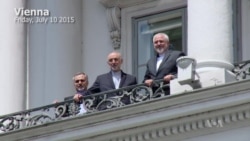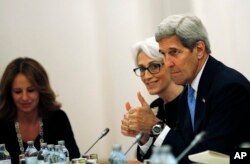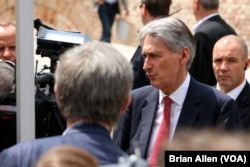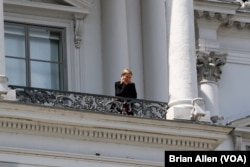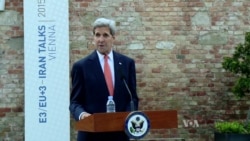Iran and major world powers are continuing grueling nuclear talks in Vienna into Saturday, after blowing past yet another deadline to reach a comprehensive deal.
U.S. Secretary of State John Kerry met for about an hour Friday with Iranian Foreign Minister Mohammad Javad Zarif and European Union foreign policy officials at a hotel in Vienna where the talks are being held.
Speaking to reporters, British Foreign Secretary Philip Hammond said major powers and Iran were making slow progress, but that ministers would reconvene Saturday to try and overcome the final hurdles.
"We are making progress, it's painfully slow," Hammond said before leaving Vienna. "There are still some issues that have to be resolved. I'm confident our officials working with the Iranians over the next 12 hours will clear some more of the text.
Zarif also said he expects the talks to last over the weekend.
Negotiators failed to meet a formal 6 a.m. deadline (0400 GMT) Friday, meaning the Republican-led U.S. Congress will now have 60 days, rather than 30, to review a deal, extra time U.S. President Barack Obama's administration worries could derail it.
As diplomats entered into their 14 consecutive day of talks in Vienna, even jokes meant to dispel tensions reflected their weariness, often relieved only by brief breaks on the balcony of the ornate Palais Coburg hotel.
"We're pushing," said Kerry when asked if there would be a deal this weekend. "Off the balcony," chimed in Federica Mogherini, the foreign policy chief of the European Union.
Kerry smiled and jokingly reprimanded her with a wave of his finger.
“That’s a joke,” Mogherini said, giving a small laugh.
Signs of strain
However, as the round of talks entered its second week, there were increasing signs of exasperation.
Late Thursday, Zarif late lashed out at “several countries” he said were shifting their positions and making “excessive demands.”
“Such issues have made the negotiations difficult. We want a dignified agreement and negotiations, and we will continue to negotiate. The deal would be within reach should the other side seek an honorable and balanced accord,” Zarif said, according to Iranian state media.
Earlier Thursday, Kerry warned if difficult decisions are not made soon, his negotiators are ready to "end this process."
"We will not rush and we will not be rushed" into reaching an agreement, Kerry told reporters in Vienna. He indicated that "real progress" is being made toward a comprehensive deal, and that the quality of any deal is the main concern.
One of the main sticking points remains: the scope of access to U.N. inspectors monitoring Iran's nuclear program. The U.S. wants no restrictions, whereas Iranian officials say they are concerned that unrestricted monitoring could be a cover for Western spying.
White House comments
The White House echoed Kerry's comments, saying President Barack Obama would bring back from Vienna the U.S. negotiating team if talks do not appear to be constructive.
"The fact that we've been very clear about our expectations for a final agreement makes it unlikely that the talks will drag on for many more weeks. But, again, I wouldn't speculate on the outcome," spokesman Josh Earnest said Thursday.
Much of the latest disagreement has centered on whether to lift a United Nations ban on selling conventional weapons to Iran.
Russian Foreign Minister Sergei Lavrov on Thursday told reporters in Ufa, Russia, where he is attending an economic summit, that Moscow favors Iran's push to lift a U.N. arms embargo.
"We are advocating for lifting of the arms embargo as soon as possible," he said.
A U.S. official close to the talks, however, told VOA, “No one is talking about lifting the arms embargo until years and years from now – if ever.”
Western officials have said they oppose ending the embargo, arguing that the parameters of a framework adopted in Lausanne, Switzerland in April call for important restrictions on conventional arms and ballistic missiles to be included in a new United Nations resolution to be drafted as part of a final agreement.
US Congress
Republican Bob Corker, chairman of the U.S. Senate Foreign Relations Committee, said Thursday he does not see the continuation of Iran nuclear talks as a problem for lawmakers.
"I'm very happy that we're not rushing to a place and taking shortcuts on the remaining issues that are left. That is to me a very good thing," Senator Corker told reporters shortly after Kerry's announcement.
Regarding a possible deal, U.S. Senator Chris Murphy, a Democrat, told VOA Thursday, “I am less optimistic than I was a week ago.
"It seems the Iranians are having a very hard time getting to ‘yes,’ but the administration has made it clear over and over that they are not going to accept a bad deal," Murphy said. "And if the president is ready to walk away from the table – if the Iranians don’t move on these last few remaining issues – I think that is comforting to his supporters and even his detractors here on Capitol Hill."
Republican Senator Ted Cruz, who also is a candidate in the 2016 presidential campaign, told VOA, "This Iranian nuclear deal goes from bad to worse to catastrophic.
"At this point, the Obama administration seems simply to be pursuing domestic political objectives and dramatically undermining the national security of this country. This deal only accelerates Iran acquiring nuclear weapons," Cruz added.
Western countries accuse Iran of seeking the capability to build nuclear weapons, while Iran has long insisted its nuclear program is solely for civilian purposes, such as medical research and generating power.
Heather Murdock, Mike Bowman and Brian Allen contributed to this report. Some material for this report came from AP and Reuters.
WATCH: U.S. Secretary of State John Kerry speaks Thursday




